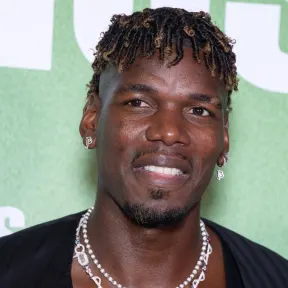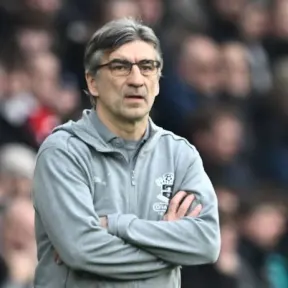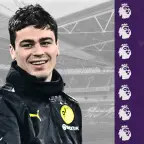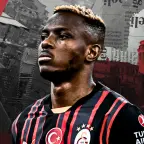The 50 most important transfers of all time (10-1)
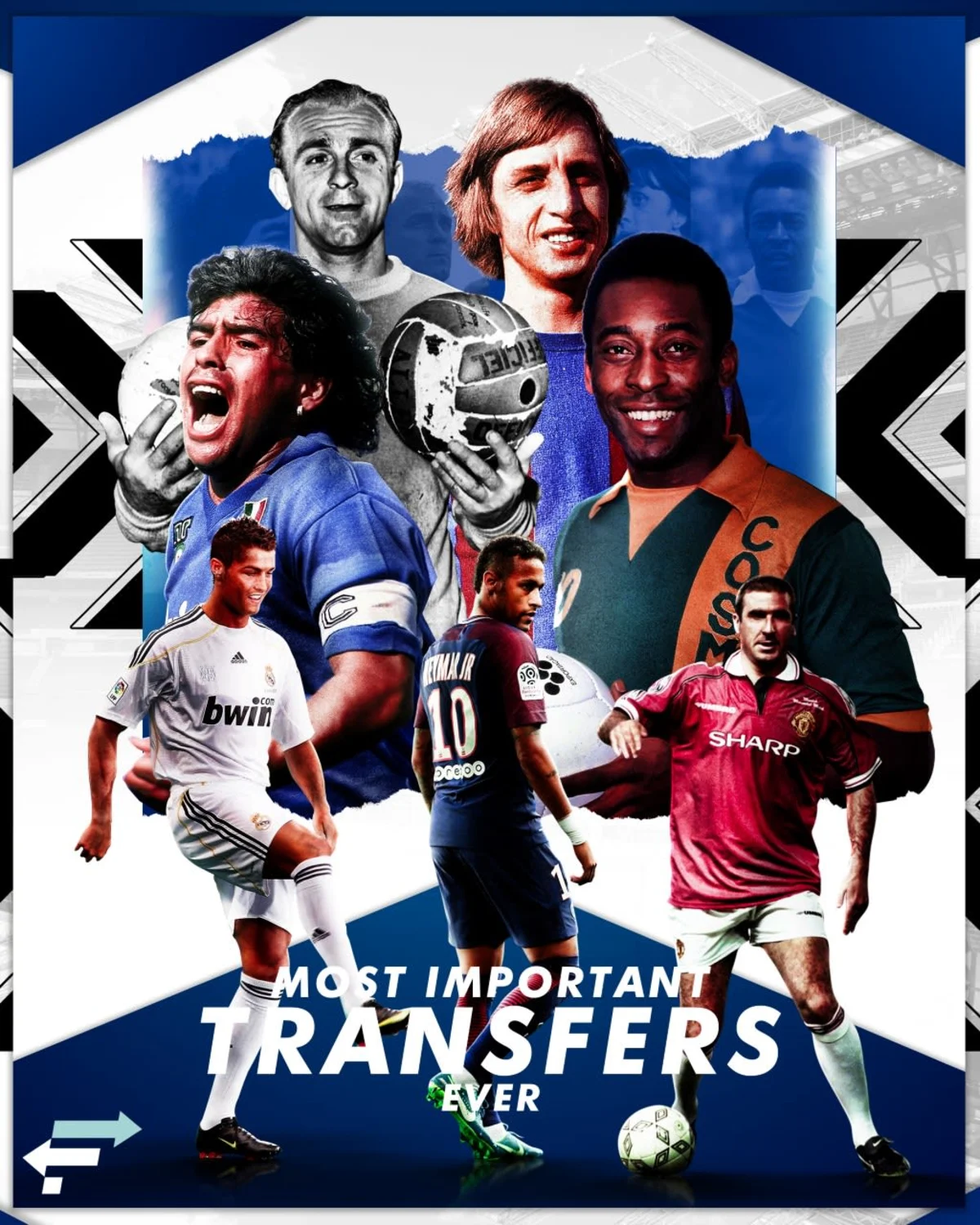
So here it is, the 50 most important transfers in football history.
FootballTransfers global team of experts - including Paul Macdonald, Robin Bairner, Carlo Garganese, Stefan Bienkowski, Martin Macdonald and Ronan Murphy – considered every major and noteworthy transfer dating back to the end of the nineteenth century.
We focused on influential, legacy-making transfers that changed or had a huge impact on the beautiful game.
It could because of a record-breaking or history-making transfer fee. It could be a transfer that broke down a social or cultural or racial barrier. It could be a transfer that transformed the fortunes of a team and led to a period of dominance. It could be a transfer that simply transcended the sport.
Our team of experts compiled a shortlist before voting on their most important transfers of all time. We added up all the votes to form a list of the top 50.
Only transfers that actually took place were considered, so we did not include Jean-Marc Bosman himself.
Youth transfers also were discarded, only first-team to first-team deals are allowed.
Therefore, Lionel Messi’s move to Barcelona as a young kid does not count.
We have five articles counting down the top 50: 50-41, 40-31, 30-21, 20-11 and then finally 10-1.
In this article, we will reveal the top 10.
READ MORE: The 50 most important transfers of all time (50-41)
READ MORE: The 50 most important transfers of all time (40-31)
READ MORE: The 50 most important transfers of all time (30-21)
READ MORE: The 50 most important transfers of all time (20-11)
10. Zinedine Zidane
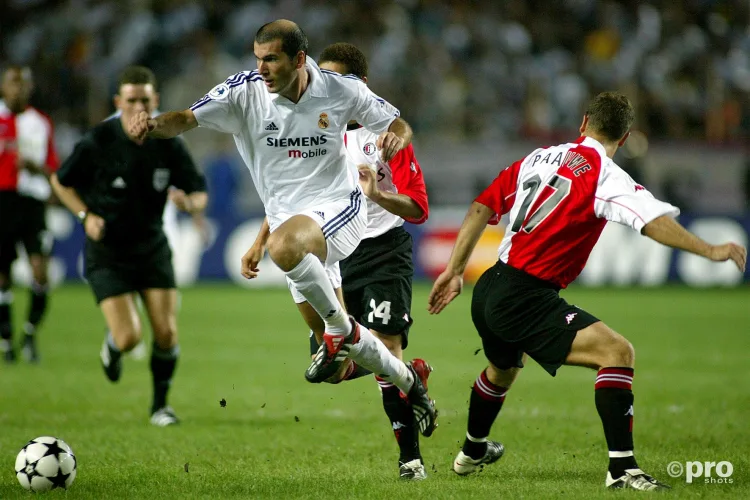
THE TRANSFER: Juventus to Real Madrid - £50m (2001)
THE BACKGROUND: Twelve months after breaking the world transfer record on Luis Figo, Real Madrid do it again by spending a mind-bending amount of money on Zinedine Zidane.
WHY IT'S IMPORTANT: Zidane establishes his legend at Real Madrid as one of the most graceful playmakers of all time, most notably by scoring one of the greatest goals ever in the Champions League final in 2002. The rest of his playing career is low-key in terms of titles won but the image of Zidane in the white shirt of Madrid transcends titles and accolades. Zidane had a 90-minute film dedicated to watching him do his thing; it's hard to imagine many other players having such a legacy.
THE LEGACY: An inflation-busting transfer that would set the tone for what was to follow, while also creating an icon.
9. Edgar Davids
Bosman freebees: Michael Reiziger and Edgar Davids sign for Milan on Bosman-style free transfers from Ajax, 30 April 1996. (Photo: Giuseppe Farinacci/ANP) pic.twitter.com/saAEyEJ83F
— A Football Archive* (@FootballArchive) January 25, 2020
THE TRANSFER: Ajax to Milan - Bosman (1996)
THE BACKGROUND: Edgar Davids, Champions League winner with Ajax, utilises the newly-formed Bosman rule to leave the Dutch side on a free transfer to sign for Milan.
WHY IT'S IMPORTANT: You can read more about the details of the Bosman deal here, and Jean-Marc Bosman’s impact on the transfer market is total. But he himself didn't actually make a transfer; the first and most high-profile player to take advantage of his years in court was Davids. The transfer itself was largely a disaster; he would make just 19 league appearances in two seasons. But it was the birth of player power, in that Davids chose to run his contract down and move where and when he wanted, rather than at the behest of the club. Player power and the concept of it has gotten stronger every year since.
THE LEGACY: Player power, and the shift from club to the agents in terms of shaping who ends up where, cannot be underestimated.
8. Alfredo Di Stefano
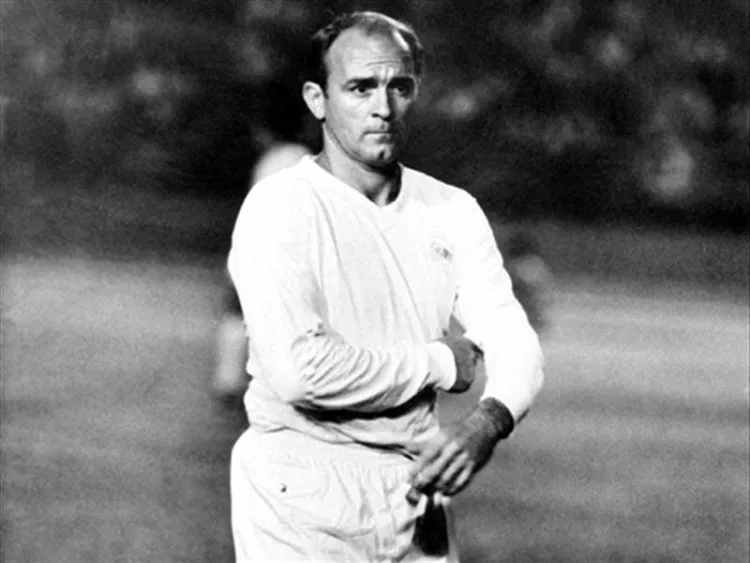
THE TRANSFER: Millonarios to Real Madrid via Barcelona - 5.5million pesetas (1953)
THE BACKGROUND: Real Madrid and Barcelona battle it out for the signing of a South American star.
WHY IT'S IMPORTANT: After touring Spain and the rest of the world with his Colombian side, Millonarios, Alfredo Di Stefano was the subject of a bidding war between Barcelona and Real Madrid. The battle between the two clubs got so fierce and complicated that FIFA had to appoint a mediator to decide, which led to each club buying 50 per cent of Di Stefano’s rights and the player playing for one and then the other club on alternative seasons. However, after a few poor appearances in Spain with Barca, the Catalan side decided to instead cash in on the striker and Madrid paid 5.5 million Spanish pesetas for Di Stefano’s permanent transfer. The Argentine would go on to become one of the club’s and European football’s most decorated stars in 11 glorious years at Madrid. He led the club to the European Cup’s first five titles and was arguably the game’s first total footballer, predating fellow pioneers Johan Cruyff and Pele.
THE LEGACY: Di Stefano's transfer played a big role in intensifying the rivalry between Madrid and Barcelona. His exploits also established Madrid's love-affair with the Champions League.
7. Carlos Tevez & Javier Mascherano
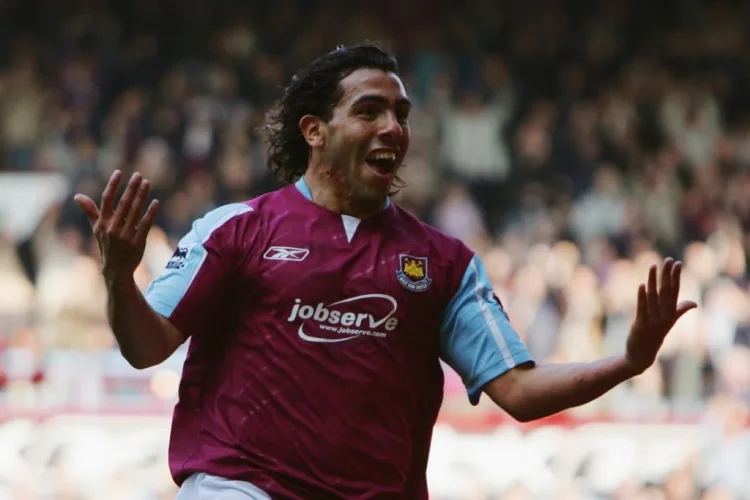
THE TRANSFER: Third party ownership to West Ham - (2006)
THE BACKGROUND: Two of the best Argentine players, Carlos Tevez and Javier Mascherano, sign for West Ham in a double deal that seemed to have surprised them as much as anyone else.
WHY IT'S IMPORTANT: A deal that exposed the darker side of transfers. Tevez and Mascherano's deal broke third-party ownership regulations, as the players were effectively owned by Kia Joorabchain's Media Sports Investment. The deal was such a surprise and yet mired in red tape that West Ham's relegation rivals sued and ultimately were successful. There was a certain naivety at the time that such relationships, with players treated purely as commodities, could exist and it helped to wake up the football world that, maybe, not everything that happened in the game was strictly legal or even morally correct.
THE LEGACY: The era of the third-party ownership begins here and extended for another decade and, arguably, never went away.
6. Eric Cantona
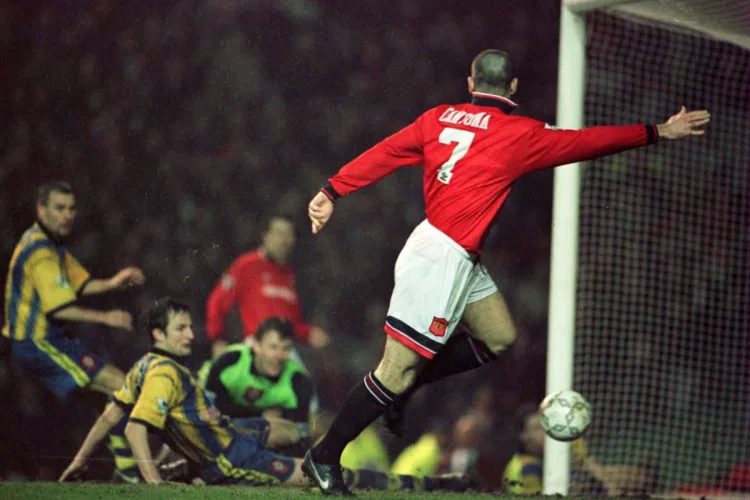
THE TRANSFER: Leeds to Man Utd - £1.2m (1992)
THE BACKGROUND: Sir Alex Ferguson phones Leeds to pick up an enigmatic Frenchman, Eric Cantona, on a cut-price deal.
WHY IT'S IMPORTANT: Ferguson and Man Utd had been a partnership for six years at this stage but the title had eluded him, despite his best efforts and his expensively-assembled team. Cantona proved to be the final piece of the puzzle, providing a different type of player that the team, and English football, hadn't seen before. His touches, kicks and flicks might seem rudimentary by modern standards but at the time in kick-and-rush England it was revolutionary. Four Premier League titles followed his arrival and whilst the move wasn't without its controversial moments, he carried United's young stars through their apprenticeship and therefore helped to shape what the team would become for the next decade and more.
THE LEGACY: Still the King as far as Old Trafford is concerned, and it's tough to imagine United and Ferguson winning 13 Premier League titles without Cantona.
5. Luis Figo
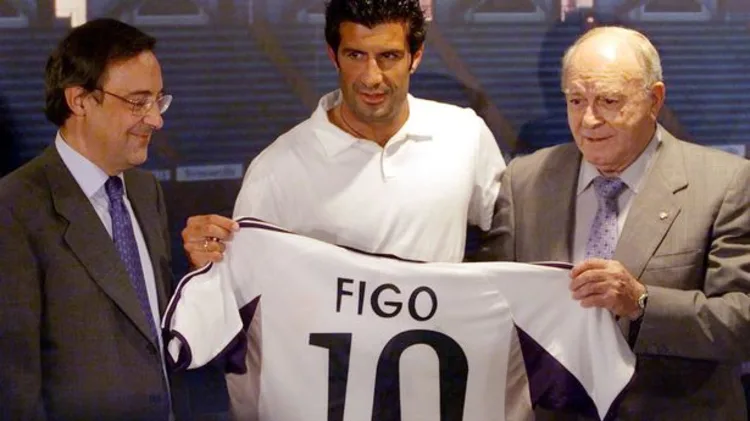
THE TRANSFER: Barcelona to Real Madrid - £37m (2000)
THE BACKGROUND: The jewel in Barcelona's crown, Luis Figo, becomes the first major signing of Florentino Perez's Galactico era, crossing one of football's bitterest rivalries for a world-record transfer.
WHY IT'S IMPORTANT: It's difficult to express just how seismic this transfer was and how it resonates still. Figo was happy to be the pantomime villain and reject a Barcelona project that was stalling to join a galaxy of the game's best talent. Perez's statement of intent was to bring the best player in the world every summer. Zinedine Zidane, Ronaldo and David Beckham would follow but Figo was the progenitor and arguably the most successful of all of those deals. The Barcelona fans, understandably, didn't take it well and the Clasicos that followed were brutal affairs, with Figo subjected to a pig's head launched in his direction.
THE LEGACY: Perez is still doing this 20 years later, and it's became generally accepted that Real Madrid will, at some point, attempt to sign the best player in the world at any given moment.
4. Diego Maradona
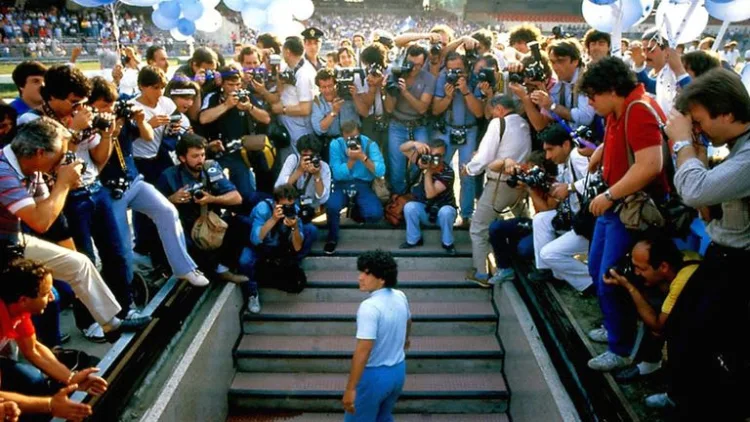
THE TRANSFER: Barcelona to Napoli - £7m (1984)
THE BACKGROUND: A Napoli team that had narrowly avoided relegation stun the world by signing the world's greatest player for a world record fee.
WHY IT'S IMPORTANT: No footballer in history has been - and probably ever will be – worshipped by a team and city like Diego Maradona was. Immediately after setting foot in the down-trodden Italian south, he instantly became a God. The Neapolitans - for decades discriminated against by the rich, industrial northern cities of Milan and Turin - looked to Maradona as their saviour who would fight against the establishment. And not only did he fight them, he beat them. He led Napoli to a historic first Scudetto in their history in 1987, before following that up with another in 1990 and a UEFA Cup in 1989. As well as the glory, his seven years in Naples were also packed full of controversy as he led a drug-fuelled life and mixed with members of the underworld, hookers and other unsavoury characters. He left in disgrace after failing a drugs test in the season after he knocked out his adopted nation from their own World Cup.
THE LEGACY: Maradona died in 2020 but his God-like status in Naples (and Argentina) will live on forever.
3. Cristiano Ronaldo
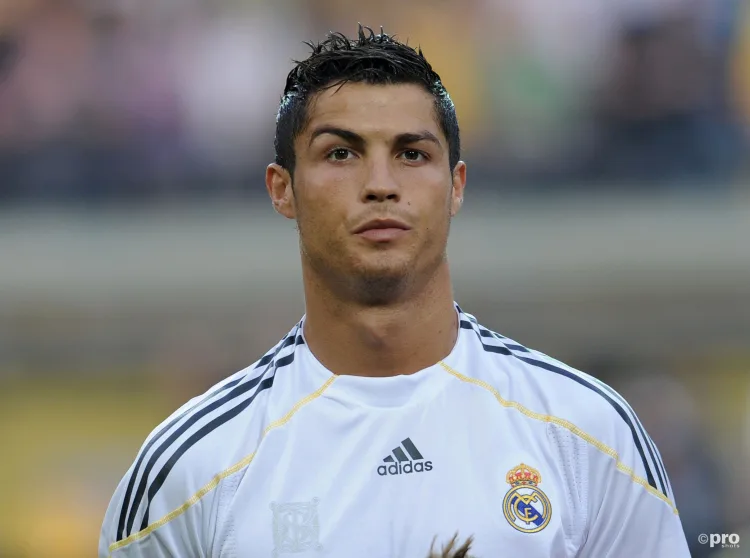
THE TRANSFER: Man Utd to Real Madrid - £80m (2009)
THE BACKGROUND: Ronaldo, unquestionably the #1 player in the world at the time, leaves Manchester United, for whom he had taken to back-to-back Champions League finals, to join Florentino Perez's crazy summer of spending in a world-record deal.
WHY IT'S IMPORTANT: Not only did the deal help to continue the story of one of the greatest players ever, he helped to end Madrid's decade-long wait to regain the Champions League. After winning the first, he added three more back-to-back. During this period both he and Lionel Messi rewrote the concept of statistics, scoring incredible volumes of goals and each pushing the other to greater and greater success. The Ronaldo v Messi argument may be tired now, but it provided a decade of sensational battles with La Liga the battleground for the tussle between two utterly generational talents.
THE LEGACY: Breaking goalscoring records to such a degree that it's unlikely that anyone will get remotely close, and re-establishing Real Madrid as the unquestionable giant of European football.
2. Neymar
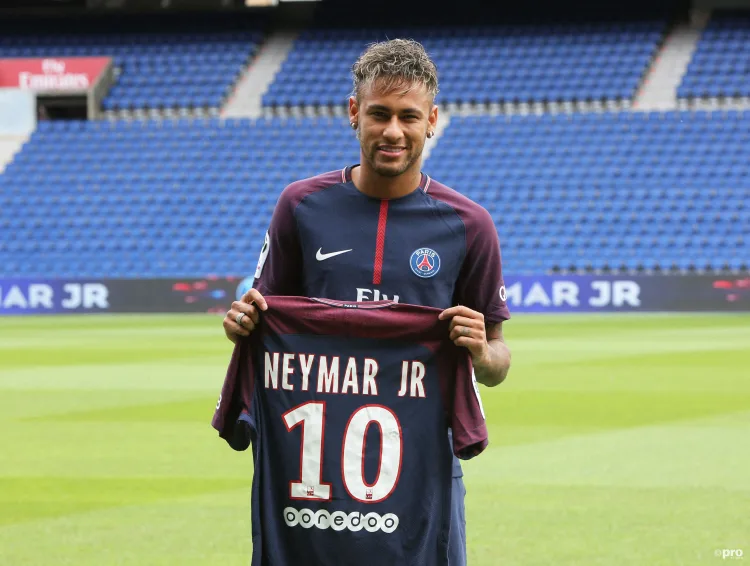
THE TRANSFER: Barcelona to PSG - £198m (2003)
THE BACKGROUND: With MSN - Lionel Messi, Luis Suarez and Neymar - at the peak of their powers the latter chose to move to PSG for a world record, unfeasible fee just short of £200m.
WHY IT'S IMPORTANT: The exact moment that the transfer market lost its collective mind. One of the great partnerships was broken up, while PSG's project immediately moved up to the next level as a result. But the legacy goes deeper; Barcelona, with money to burn, would dive deep into the market and make some of the worst transfer decisions any modern club could possibly make, simultaneously creating the debt hole they find themselves in now, while also inflating the market for every other deal that would come after. But also, it could be argued, it was the beginning of the end for Neymar, who could have been the best player in the world but was demotivated by playing in Ligue 1.
THE LEGACY: FIFA trying to tear up the transfer market and find something more in line with reality in the face of such an extravagant deal.
1. Johan Cruyff
Johan Cruyff pelo Barcelona como jogador:
• 174 jogos
• 59 gols
• 5 assistências
🏆 Copa do Rei
🏆 La Liga pic.twitter.com/nmkfLZZXPx— Central FC Barcelona (@centraldofcb) March 24, 2022
THE TRANSFER: Barcelona to Ajax - £1.5m (1973)
THE BACKGROUND: Johan Cruyff had helped to establish Ajax as the best team in Europe on a consistent basis and Barcelona, at the time in the shadow of Real Madrid, hoped he could repeat the feat in Catalunya.
WHY IT'S IMPORTANT: His five-year spell as a player only yielded one La Liga title, but the legacy beyond is one of the most profound in the history of the sport. The ‘Total Football’ he cultivated at Ajax bore fruit at Barcelona as a coach, with his 'Dream Team' boasting talents such as Romario and Michael Laudrup and winning four consecutive titles as well as the 1992 European Cup. His approach to the game heavily influenced Pep Guardiola, who featured in central midfield for Cruyff's side and returned to coach one of the greatest teams in history. Cruyff's DNA continues to be intertwined with the very soul of the club, and current coach Xavi is another of his disciples.
THE LEGACY: Five Champions Leagues, Pep Guardiola, tiki taka, and now Xavi. The most influential thinker in football created the modern version of one of the most influential clubs.

